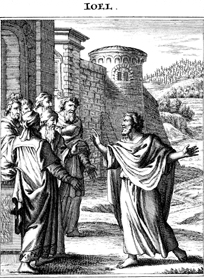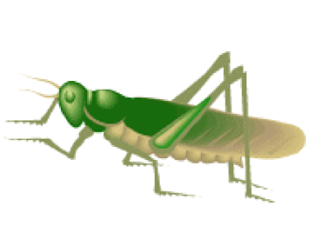TODAY’S SPECIAL: Joel 1:1-4 and 10-14
TO CHEW ON: The fields are ruined, the ground is dried up; the grain is destroyed, the new wine is dried up, the oil fails. Joel 1:10
Which people do we go to, to find out what might happen in the future
weathermen scientists prophets
I’m sure you’d agree that in our time we may go to weathermen and scientists, but we don’t often go to prophets. Even in Bible times people sometimes made fun of what prophets predicted. Yet God chose to speak through these ordinary men who didn’t speak their own ideas but said what God told them to say.
Joel was such a prophet. He lived in Judah around the time Joash was crowned king. He had seen the way King Jehoram and Ahaziah and then Queen Athaliah had turned the people away from praying to God.
When Joash became king, Joel hoped that things would be different. And they were for a while. As long as Priest Jehoiada was alive Joash followed his advice and honored God. But after Jehoiada died, Joash stopped worshiping at the temple. He put up Asherah poles and soon the land was filled with idols again.
One day God gave Joel a message for the king and people of Judah. He told them to come back to Him because if they didn’t, bad things would happen to their crops and land.

1.What bad things did Joel predict? (Joel 1:1-4):
a] Plague of locusts
b] Flooded harvest
c] Mildew
d] Dried up harvest
2. What should the people do to show God that they were sorry for ignoring Him and worshiping idols? (Joel 1: 13,14)
a] Fast
b] Live in caves
c] Gather to pray
d] Cry out to God
Through Joel God told the people about an important connection. Their obedience or disobedience would decide whether God would bless and protect their land and crops – or not.
What do you think – are obedience and blessing still connected in our time?

PRAYER: Dear God, please help me to see and understand the consequences of the way I live my life. Amen
MORE: Locusts
Find out through books or the internet about Locusts:
1. Where do they live?
2. What do they eat?
3. How small or big are they?
4. How can a locust become a plague?
5. Are there still locust plagues today?
Answers